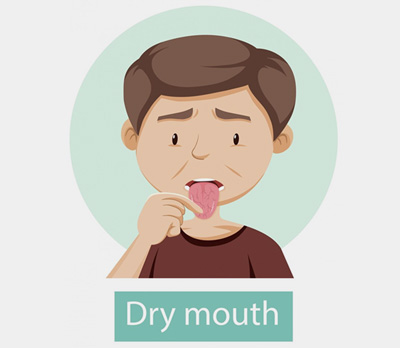Introduction
Sjogren's Syndrome is an autoimmune disorder characterised by the body's immune system attacking the glands responsible for producing saliva and tears, leading to symptoms such as dry mouth (xerostomia) and dry eyes (xerophthalmia). This condition significantly impacts the quality of life of those affected, causing various other symptoms and complications.
Understanding Sjogren's Syndrome
Sjogren's Syndrome is a chronic autoimmune disorder where the body's immune system mistakenly attacks its own moisture-producing glands, specifically the salivary and lacrimal glands responsible for saliva and tear production.The condition can also affect other parts of the body, including the joints, thyroid, kidneys, liver, lungs, skin, and nerves.

Causes of Sjogren’s Syndrome
- Genetic
- Environmental trigger, it can be associated with- autoimmune diseases like rheumatoid arthritis, systemic lupus erythematosus
Symptoms of Sjogren’s Syndrome
- Major or moderate impact on their life:
- Fatigue (79%)
- Dry eyes (75%)
- Dry mouth (73%)
- Joint pain (65%)
- Muscle pain (56 %)
- Trouble sleeping (64%)
- Eye discomfort (60 %)
- Brain fog (54 %)


The significant symptoms are dry eyes (xerophthalmia) & dry mouth (xerostomia) along with this other attending eye symptoms include itching, burning, stinging, redness & sand like gritty sensation in eyes, dry mouth may lead to difficulty in speaking, difficulty in swallowing & the tongue adhering to the roof of the mouth, dryness & cracks of the lips, having dry mouth predisposes a person to get oral fungal infections & tooth decay.
Other symptoms may include pain, stiffness, & swelling in the joints, tiredness, dry itchy skin. In some cases swelling of salivary glands, prolonged dry cough, & muscle aches. Women may experience vaginal dryness.
Risk Factors for Sjogren’s Syndrome
It’s a disease of autoimmune origin where the immune cells start to destroy healthy body tissues as a result of a misplaced immune response. The glands that make saliva & tears are destroyed in this condition. Certain risk factors include a genetic predisposition to develop this condition –like rheumatoid arthritis, lupus or it can be present with other autoimmune diseases, women are at a higher risk to develop this condition compared to males. It is mostly diagnosed at the age of 40 years or above.
Diagnosis
- Blood Tests:for ANA & rheumatoid factor
- Levels of different types of blood cells
- Presence of antibodies common in Sjogren's syndrome
- Evidence of inflammatory conditions
- Indications of problems with your liver and kidneys
- USG
- Lip Biopsy
lip biopsy to detect the presence of clusters of inflammatory cells, which can indicate Sjogren's syndrome. For this test, a sliver of tissue is removed from salivary glands in your lip and examined under a microscope.
- Saliva Flow Test
- Imaging
- Sialogram :This special X-ray can detect dye that's injected into the salivary glands in front of your ears. This procedure shows how much saliva flows into your mouth.
- Salivary Scintigraphy: This nuclear medicine test involves the injection into a vein of a radioactive isotope, which is tracked over an hour to see how quickly it arrives in all your salivary glands.
Homoeopathy and Sjogren's Syndrome
Homoeopathy offers a personalised approach to managing Sjogren's Syndrome, focusing on individual symptoms and overall health
Homoeopathic Medicines for Sjogren’s Syndrome
- Nux Moschata
- Dry mouth
- Tongue sticks to the roof of mouth
- Thirstlessness
- Dryness of mouth experienced while sleeping, lack of thirst
- Bad smell from mouth, Dry lips
- Dryness of throat
- Tongue numb, paralyzed
- Belladonna
- Dryness of eyes
- Redness
- In some cases; a burning, smarting & stinging sensation in eyes
- Sand like gritty sensation in eyes
- Diplopia, squinting, spasms of lids
- Eyes feel swollen and protruding
- Rhus Tox
- Pain, swelling, redness,
- Heat in joints with marked stiffness.
- Cracking on stretching
- Better by warmth application
- Tearing down thighs
- Numbness and formication
- Tenderness about knee-joint
- Bryonia
- Dry spasmodic cough
- Tickling sensation in throat
- Cough worse after eating, drinking, vomiting, pain head and chest
- Cracked lips with dry mouth, joint pain worsen from motion better by rest
- Excessive thirst
- Dropsical effusions into synovial and serous membranes.
- Sulphur
- Dry, itchy skin
- Bleeding appears upon scratching worse in the night time specially upon getting warm in the bed.
- Dry, scaly, unhealthy; every little injury
- Sepia
- For vaginal dryness
- Itching.
- Painful intercourse from extreme dryness in vagina.
Benefits of Homoeopathic Treatment
- Individualised Care: Homoeopathy recognizes that each person is unique. A homoeopath will assess your symptoms, medical history, and lifestyle to prescribe a personalised treatment plan tailored to your needs.
- Gentle and Natural: Homoeopathic remedies are derived from natural substances and are known for their minimal side effects. They work in harmony with the body, promoting self-healing and overall well-being.
- Holistic Approach: Homoeopathy takes into account not only the physical symptoms but also the emotional and mental aspects of an individual. It aims to restore balance at all levels, providing comprehensive care.
- Long-Term Relief: By addressing the underlying causes of Ulcerative Colitis,homoeopathy strives to achieve long-term relief and improved quality of life.
Consulting a Homeopath
Homoeopathic treatment is highly individualised. A homoeopath will consider your unique symptoms, medical history, and lifestyle to formulate a personalised treatment plan. This approach ensures gentle, natural, and holistic care, addressing physical, emotional, and mental aspects of health. By targeting the root cause, Sanjivani homoeopathy aims to provide long-term relief and improve overall well-being.
Sanjivani Homeopathy Clinic USP
- No homoeopathy Dietary Restrictions:
Allows patients to enjoy foods like onion, garlic, and coffee, ensuring a stress-free treatment journey.
- 24/7 Online Consultations:
Enables convenient access to doctors with detailed counseling, history management, and follow-ups.
- Highly Skilled Team:
Experienced BHMS and MD doctors, supported by multilingual and professional staff.
- Patient-Centric Care:
Simplifies treatment with modern, adaptable solutions and clear communication.
Click Here for Detailed "Sanjivani USP"
FAQ's
- What is homoeopathy ?
Homoeopathy is a holistic science which belives in the law of Similia Similibus Curenter i.e Like Cures Like .It was discovered by Dr Samuel Christian Hahnemannn in 1796.
- Is there any side effects of homoeopathy?
As homoeopathic medicines are made from natural substances this medicines have no side effects and are completely safe to consume
- Is there any diet restriction to take homoeopathic medicines?
There are no diet restrictions for homoeopathic medicines. One should only avoid eating or drinking any liquid other than water at least 30 minutes before and after taking homoeopathic medicines.
Click Here for "Frequently Asked Questions."
Conclusion
Homoeopathic medicines offer a safe and effective way to manage Sjogren's Syndrome by moderating the immune system and alleviating symptoms. However, it's crucial to undergo a thorough evaluation by a qualified Sanjivani homoeopathic physician to ensure appropriate treatment tailored to individual needs. Always consult a healthcare professional before starting any new treatment.
Disclaimer: The information provided in this blog is for educational purposes only and should not be considered medical advice. Please consult with a qualified healthcare professional before starting any treatment for Sjogren’s Syndrome or any other medical condition.


